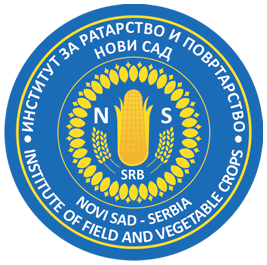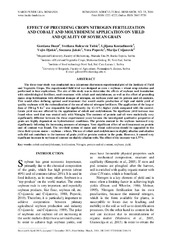Приказ основних података о документу
Effect of preceding crops nitrogen fertilization and cobalt and molybdenum application on yield and quality of soybean grain
| dc.creator | Dozet, Gordana | |
| dc.creator | Balešević-Tubić, Svetlana | |
| dc.creator | Kostadinović, Ljiljana | |
| dc.creator | Đukić, Vojin | |
| dc.creator | Jakšić, Snežana | |
| dc.creator | Popović, Vera | |
| dc.creator | Cvijanović, Marija | |
| dc.date.accessioned | 2021-04-26T19:27:42Z | |
| dc.date.available | 2021-04-26T19:27:42Z | |
| dc.date.issued | 2016 | |
| dc.identifier.issn | 1222-4227 | |
| dc.identifier.uri | http://fiver.ifvcns.rs/handle/123456789/1590 | |
| dc.description.abstract | The three-year study was conducted on a calcareous chernozem experimental plot of the Institute of Field and Vegetable Crops. The experimental field trial was designed as corn soybean wheat crop rotation and performed in four replications. The aim of this study was to determine the effects of soybean seed inoculation with microbiological fertilizer, seed treatment with cobalt and molybdenum, as well as the effect of preceding maize crop fertilization with different dosages of nitrogen, on soybean yield and its protein and oil contents. This would allow defining optimal seed treatment that would enable production of high and stable yield of quality soybeans with the rationalization of the use of mineral nitrogen fertilizers. The application of the largest dose of 250 kg N ha(-1) was responsible for significantly (by 12.11%) higher yields compared with the control. Grain yield was not affected by the application of cobalt and molybdenum. No significant yield increase was found when seed that was treated only with Nitragin. The contents of protein and oil were statistically very significantly different between the three experimental years because the investigated qualitative properties of grain are highly dependent on hydrothermal conditions. The protein content in the soybean increased very significantly following the increasing amounts of nitrogen. Very significant effect of seed treatment on protein and oil content was found. The two-field system of maize and wheat cultivation should be upgraded to the three-field system: maize - soybean - wheat. The use of cobalt and molybdenum in slightly alkaline and alkaline soils did not contribute to the increase of grain yield or protein content in the grain. However, it caused very significant increase in soybean oil content on slightly alkaline soils. The effect of the increase was 1.77%. | en |
| dc.publisher | Natl Agricultural Research & Development Inst, Fundulea | |
| dc.rights | openAccess | |
| dc.source | Romanian Agricultural Research | |
| dc.subject | cobalt and molybdenum | en |
| dc.subject | fertilization | en |
| dc.subject | Nitragin | en |
| dc.subject | protein and oil content | en |
| dc.subject | soybean | en |
| dc.subject | yield | en |
| dc.title | Effect of preceding crops nitrogen fertilization and cobalt and molybdenum application on yield and quality of soybean grain | en |
| dc.type | article | |
| dc.rights.license | ARR | |
| dc.citation.epage | 143 | |
| dc.citation.other | 33: 133-143 | |
| dc.citation.rank | M23 | |
| dc.citation.spage | 133 | |
| dc.citation.volume | 33 | |
| dc.identifier.fulltext | http://fiver.ifvcns.rs/bitstream/id/1890/1587.pdf | |
| dc.identifier.rcub | https://hdl.handle.net/21.15107/rcub_fiver_1590 | |
| dc.identifier.scopus | 2-s2.0-84961285339 | |
| dc.identifier.wos | 000387093600015 | |
| dc.type.version | publishedVersion |


